暑期初高中衔接英语语法专项练习:IX被动语态和短语动词含答案
初中英语语法被动语态专练(附习题和答案)
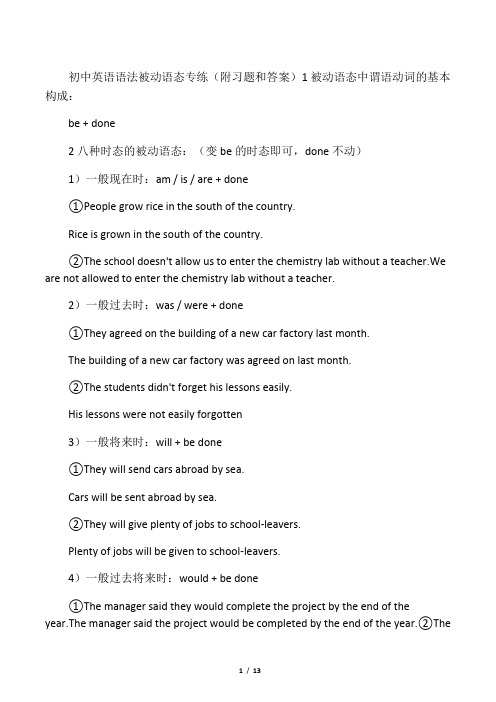
初中英语语法被动语态专练(附习题和答案)1被动语态中谓语动词的基本构成:be + done2八种时态的被动语态:(变be的时态即可,done不动)1)一般现在时:am / is / are + done①People grow rice in the south of the country.Rice is grown in the south of the country.②The school doesn't allow us to enter the chemistry lab without a teacher.We are not allowed to enter the chemistry lab without a teacher.2)一般过去时:was / were + done①They agreed on the building of a new car factory last month.The building of a new car factory was agreed on last month.②The students didn't forget his lessons easily.His lessons were not easily forgotten3)一般将来时:will + be done①They will send cars abroad by sea.Cars will be sent abroad by sea.②They will give plenty of jobs to sch ool-leavers.Plenty of jobs will be given to school-leavers.4)一般过去将来时:would + be done①The manager said they would complete the project by the end of the year.The manager said the project would be completed by the end of the year.②Theworkers told me they would mend the car as soon as possible.The workers told me that the car would be mended as soon as possible.5)现在进行时:am / is / are + being + done①The radio is broadcasting English lessons.English lessons are being broadcasted on the radio.②We are painting the rooms.The rooms are being painted.6)过去进行时:was / were + being + done①The workers were mending the road.The road was being mended.②This time last year we were planting trees here.Trees were being planted here this time last year.7)现在完成时:have / has + been + done①Someone has told me the sports meeting might be put off.I have been told the sports meeting might be put off.②He has brought his book here.His book has been brought here.8)过去完成时:had + been + done①When I got to the theatre, I f ound they had already sold out the tickets.WhenI got to the theatre, I found the tickets had already been sold out.②The whole country was very sad at the news of his death; people hadconsidered him to be a great leader.The whole country was very sad at the news of his death; he had beenconsidered to be a great leader3含有情态动词的被动语态:情态动词+ be+ done①You must hand in your compositions after class.Your compositions must be handed in after class.②He can write a great many letters with the computer.A great many letters can be written with the computer by him.4被动语态的使用情况:1)当不知道或没有必要指出动作的执行者时,这时往往不用by短语。
被动语态练习题含答案及解析
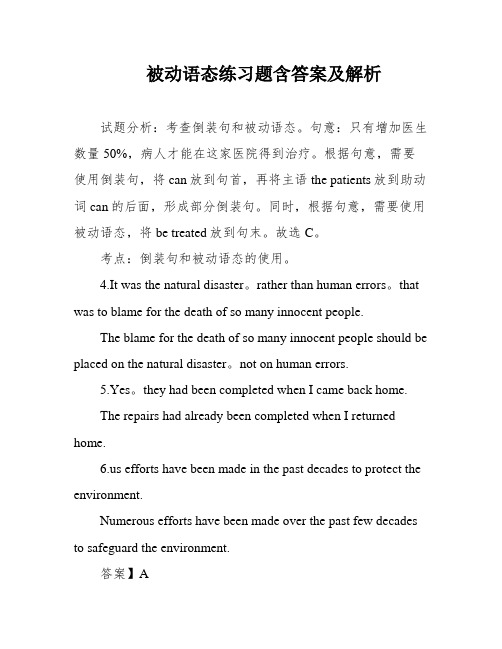
被动语态练习题含答案及解析试题分析:考查倒装句和被动语态。
句意:只有增加医生数量50%,病人才能在这家医院得到治疗。
根据句意,需要使用倒装句,将can放到句首,再将主语the patients放到助动词can的后面,形成部分倒装句。
同时,根据句意,需要使用被动语态,将be treated放到句末。
故选C。
考点:倒装句和被动语态的使用。
4.It was the natural disaster。
rather than human errors。
that was to blame for the death of so many innocent people.The blame for the death of so many innocent people should be placed on the natural disaster。
not on human errors.5.Yes。
they had been completed when I came back home.The repairs had already been completed when I returned home. efforts have been made in the past decades to protect the environment.Numerous efforts have been made over the past few decades to safeguard the environment.答案】A改写】所有医生都坚称他受了重伤,需要立即进行手术。
解析】考查虚拟语气。
句意:医院里的所有医生都坚称他受了重伤,需要立即进行手术。
insist后面接的是虚拟语气,表示建议或要求,should be表示“应该被”,be operated on表示“接受手术”,故选A。
文章已经没有明显的格式错误和问题段落了。
(完整版)初中英语被动语态语法及练习题(有答案)
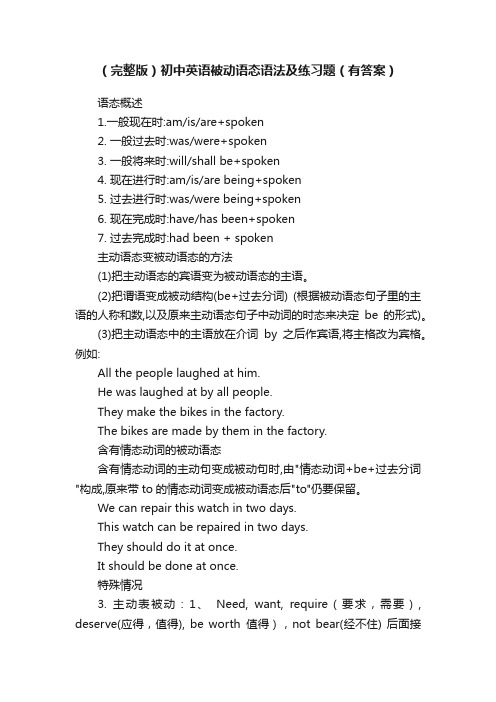
(完整版)初中英语被动语态语法及练习题(有答案)语态概述1.一般现在时:am/is/are+spoken2. 一般过去时:was/were+spoken3. 一般将来时:will/shall be+spoken4. 现在进行时:am/is/are being+spoken5. 过去进行时:was/were being+spoken6. 现在完成时:have/has been+spoken7. 过去完成时:had been + spoken主动语态变被动语态的方法(1)把主动语态的宾语变为被动语态的主语。
(2)把谓语变成被动结构(be+过去分词) (根据被动语态句子里的主语的人称和数,以及原来主动语态句子中动词的时态来决定be的形式)。
(3)把主动语态中的主语放在介词by之后作宾语,将主格改为宾格。
例如:All the people laughed at him.He was laughed at by all people.They make the bikes in the factory.The bikes are made by them in the factory.含有情态动词的被动语态含有情态动词的主动句变成被动句时,由"情态动词+be+过去分词"构成,原来带to的情态动词变成被动语态后"to"仍要保留。
We can repair this watch in two days.This watch can be repaired in two days.They should do it at once.It should be done at once.特殊情况3. 主动表被动:1、Need, want, require(要求,需要), deserve(应得,值得), be worth值得),not bear(经不住) 后面接doing主动表被动。
初中英语语法被动语态专练(附习题和答案)

初中英语语法被动语态专练(附习题和答案)1被动语态中谓语动词的基本构成:be + done2八种时态的被动语态:(变be 的时态即可,done不动)1)一般现在时:am / is / are + done①People grow rice in the south of the country.Rice is grown in the south of the country.②The school doesn't allow us to enter the chemistry lab without a teacher.We are not allowed to enter the chemistry lab without a teacher.2)一般过去时:was / were + done①They agreed on the building of a new car factory last month.The building of a new car factory was agreed on last month.②The students didn't forget his lessons easily.His lessons were not easily forgotten3)一般将来时:will + be done①They will send cars abroad by sea.Cars will be sent abroad by sea.②They will give plenty of jobs to school-leavers.Plenty of jobs will be given to school-leavers.4)一般过去将来时:would + be done①The manager said they would complete the project by the end of the year. The manager said the project would be completed by the end of the year.②The workers told me they would mend the car as soon as possible.The workers told me that the car would be mended as soon as possible. 5)现在进行时:am / is / are + being + done①The radio is broadcasting English lessons.English lessons are being broadcasted on the radio.②We are painting the rooms.The rooms are being painted.6)过去进行时:was / were + being + done①The workers were mending the road.The road was being mended.②This time last year we were planting trees here.Trees were being planted here this time last year.7)现在完成时:have / has + been + done①Someone has told me the sports meeting might be put off.I have been told the sports meeting might be put off.②He has brought his book here.His book has been brought here.8)过去完成时:had + been + done①When I got to the theatre, I found they had already sold out the tickets. When I got to the theatre, I found the tickets had already been sold out.②The whole country was very sad at the news of his death; people had considered him to be a great leader.The whole country was very sad at the news of his death; he had been considered to be a great leader3含有情态动词的被动语态:情态动词+ be+ done①You must hand in your compositions after class.Your compositions must be handed in after class.②He can write a great many letters with the computer.A great many letters can be written with the computer by him.4被动语态的使用情况:1)当不知道或没有必要指出动作的执行者时,这时往往不用by 短语。
高中英语--被动语态专项讲解及练习(有答案)
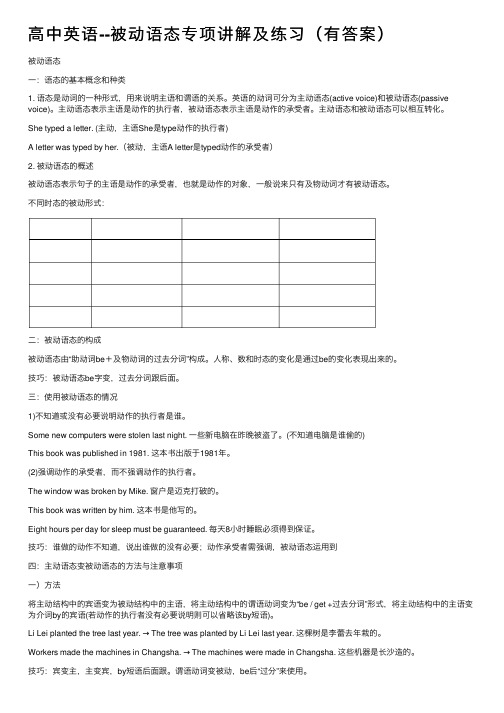
⾼中英语--被动语态专项讲解及练习(有答案)被动语态⼀:语态的基本概念和种类1. 语态是动词的⼀种形式,⽤来说明主语和谓语的关系。
英语的动词可分为主动语态(active voice)和被动语态(passive voice)。
主动语态表⽰主语是动作的执⾏者,被动语态表⽰主语是动作的承受者。
主动语态和被动语态可以相互转化。
She typed a letter. (主动,主语She是type动作的执⾏者)A letter was typed by her.(被动,主语A letter是typed动作的承受者)2. 被动语态的概述被动语态表⽰句⼦的主语是动作的承受者,也就是动作的对象,⼀般说来只有及物动词才有被动语态。
不同时态的被动形式:⼆:被动语态的构成被动语态由“助动词be+及物动词的过去分词”构成。
⼈称、数和时态的变化是通过be的变化表现出来的。
技巧:被动语态be字变,过去分词跟后⾯。
三:使⽤被动语态的情况1)不知道或没有必要说明动作的执⾏者是谁。
Some new computers were stolen last night. ⼀些新电脑在昨晚被盗了。
(不知道电脑是谁偷的)This book was published in 1981. 这本书出版于1981年。
(2)强调动作的承受者,⽽不强调动作的执⾏者。
The window was broken by Mike. 窗户是迈克打破的。
This book was written by him. 这本书是他写的。
Eight hours per day for sleep must be guaranteed. 每天8⼩时睡眠必须得到保证。
技巧:谁做的动作不知道,说出谁做的没有必要;动作承受者需强调,被动语态运⽤到四:主动语态变被动语态的⽅法与注意事项⼀)⽅法将主动结构中的宾语变为被动结构中的主语,将主动结构中的谓语动词变为“be / get +过去分词”形式,将主动结构中的主语变为介词by的宾语(若动作的执⾏者没有必要说明则可以省略该by短语)。
被动语态专项练习附答案
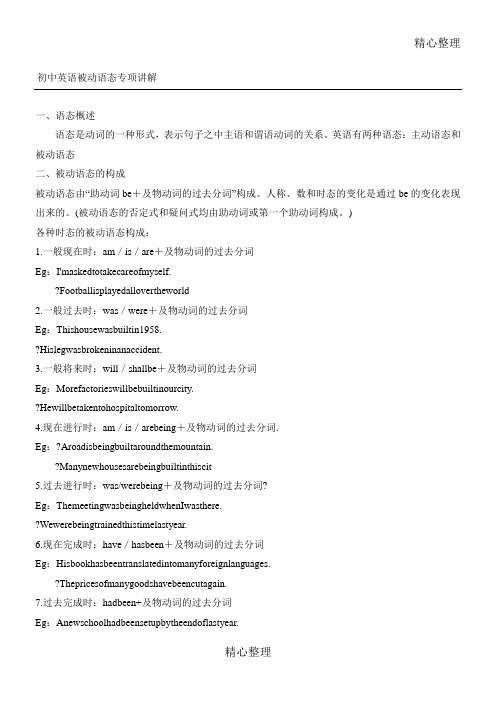
精心整理初中英语被动语态专项讲解一、语态概述语态是动词的一种形式,表示句子之中主语和谓语动词的关系。
英语有两种语态:主动语态和被动语态二、被动语态的构成1.Eg:2.Eg:3.Eg:4.Eg:5.Eg:?Wewerebeingtrainedthistimelastyear.6.现在完成时:have/hasbeen+及物动词的过去分词Eg:Hisbookhasbeentranslatedintomanyforeignlanguages.?Thepricesofmanygoodshavebeencutagain.7.过去完成时:hadbeen+及物动词的过去分词Eg:Anewschoolhadbeensetupbytheendoflastyear.8.含有情态动词的被动语态:情态动词+be+及物动词的过去分词Eg:Therubbishcanbeputintothedustbinoverthere.4.含有情态动词的被动语态含有情态动词的主动语态变成被动语态时,由“情态动词+be+过去分词”构成,原来带to的情态动词变成被动语态后“to”仍要保留。
Eg:We canrepairthiswatchintwodays.→Thiswatchcanberepairedintwodays.以外还1.…被2.Eg:3.Eg:4.在Eg:5.在1).bemadein表示“在某地制造”Eg:ThisTvsetismadeinshanghai.2).bemadeof和bemadefrom都可以表示“由…制成的”,但bemadeof强调从制成品上可以看出原材料,bemadefrom则表示从制成品上看不出原材料。
Eg:1.Thistableismadeofwood.2.Thiskindofpaperismadefromwood.3).bemadeby由…(人)制造的Eg:Thecakeismadebymymother.4).bemadeinto表示“被制成...”make…into把…制成…(主动形式)Eg:Glassisoftenmadeintoglasses.玻璃常被制成玻璃杯。
初中英语被动语态专项练习(附带答案)
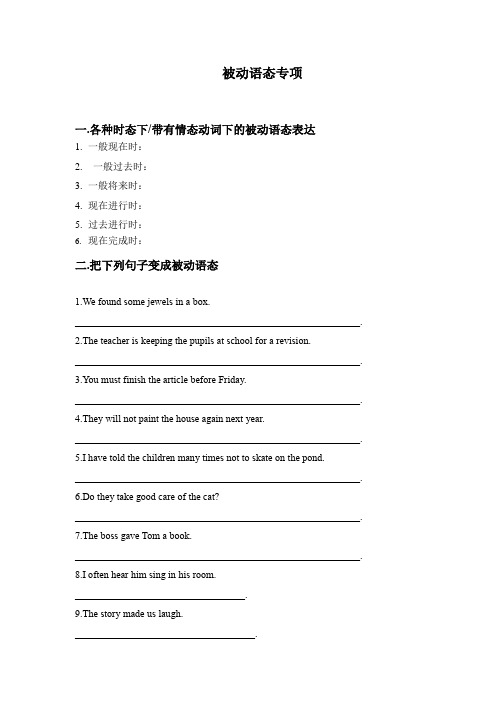
被动语态专项一.各种时态下/带有情态动词下的被动语态表达1.一般现在时:2.一般过去时:3.一般将来时:4.现在进行时:5.过去进行时:6.现在完成时:二.把下列句子变成被动语态1.We found some jewels in a box._________________________________________________________.2.The teacher is keeping the pupils at school for a revision._________________________________________________________.3.You must finish the article before Friday._________________________________________________________.4.They will not paint the house again next year._________________________________________________________.5.I have told the children many times not to skate on the pond._________________________________________________________.6.Do they take good care of the cat?_________________________________________________________.7.The boss gave Tom a book._________________________________________________________.8.I often hear him sing in his room.__________________________________.9.The story made us laugh.____________________________________.三.单项填空( ) 1 Now these magazines___ in the library for a long time.A.have keptB. are keepingC. have been keepingD. have been kept( ) 2 The pot ___ for ___ hot water.A. used; keepingB. was used; keepingC. is used; to keepD. are used; keep( ) 3 Tea ___ in the south of China.A.growsB. is grownC. were grownD. will grow( ) 4 The bridges___ two years ago.A. is builtB. builtC. were builtD. was built( ) 5 Wet clothes are often ___ up near a fire in rainy weather.A. hangB. hangedC. hangingD. hung( ) 6. The river smells terrible. People must ___ dirty things into it.A. be stopped to throwB. be stopped from throwingB.stop to throw D. stop from throwing( ) 7. The teapot ___ water.A.is filled withB. filled ofC. fulling ofD. filled( ) 8. Old people must be looked after well and ___ politely.A. speak toB. spokenC. speakD. spoken to( ) 9. Newly-born babies___in hospital.A. are taken good careB. are taken good care ofC.take good care ofD. take good care( )10. They were___ at the sudden noise.A. frighteningB. frightenedC. frightenD. frightens( ) 11.These walls___stone.A. are made ofB. made ofC. are made intoD. made into( ) 12 Jane ___ to sing us an American song last Saturday.A. calledB. was askedC. toldD. was said( ) 13. The papers ___ to them.A.were shownB. showC. shownD. have shown( ) 14.The coat___her sister.A.made toB. were made forC. was made forD. was made to( ) 15. I ___ five minutes to decide whether I should go or not.A. gaveB. was givingC. had givenD. was given( ) 16. The teacher made him___ his homework.A.to doB. doC. didD. done( ) 17.The boy___ streets without pay in the old days.A. was made to cleanB. made cleanB.made to clean D. was made clean( ) 18. These children____dance.A.were seen toB. were seen forC. were seenD. saw to( )19. The important meeting ___ on a cold morning last year.A. was heldingB. was heldC. heldD. hold( )20 Great changes___ in the past ten years in China.A. took placeB. have taken placeC. were taking placeD. had taken place( )21. The People's Republic of China ___ on October 1, 1949.A. foundB. was foundedC. is foundedD. was found( )22. English ____ in Canada.A.speaksB. are spokenC. is speakingD. is spoken( )23. Our room must ___ clean.A. keepB. be keptC. to be keptD. to keep( )24. -I'd like to buy that coat.-I'm sorry. ___. A. it sold B. it's selling C. It's been sold D. it had been sold ( )25. A new house ___ at the corner of the road these days.A. is buildingB. is being builtC. been builtD. be building( ) 26. The key ___on the table when I leave.A. was leftB. will be leftC. is leftD. has been left( ) 27. Doctors ___ in every part of the world.A. needB. are needingC. are neededD. will need( ) 28. His new book___ next month.A. will be publishedB. is publishingC. is being publishedD. has been published( ) 29 ___ the watch been repaired yet? I badly need it.A. DoesB. HasC. IsD. Are( ) 30. The books may___ for two weeks.A. be keptB. be borrowedC. keepD. borrow( ) 31. The broken bike____ here by Mr Smith.A. can mendB. can mendedC. can be mendD. can be mended ( ) 32. The play ___ at the theatre next Sunday.A. is going to be shownB. will shownC. will showD. is shown ( ) 33. Great changes___in our country during the past 20 years. A. have happened B. happenedC. have been happenedD. were happened( ) 34. He fell from his bike and ___.A. is hurtB. gets hurtC. got hurtD. hurt( )35 .The apple___very sweet.A. is tastedB. taste -C. tastesD. are tasting( ) 36.You___ more beautiful in the light blue shirt.A. seeB. watchC. lookD. look at( )37. What you said ___. like a good idea.A. heardB. listenedC. soundD. sounded( ) 38. -What do you think of the TV play?-Wonderful. It is worth___ a second time.A. watchingB. watchedC. seenD. seeing( )39.How dirty the tables are! They need___.A. to cleanB. cleanC. cleaningD. cleaned( )40.The book is worth ___. A. seeing B. reading C. seen D. read答案:1.some pupils were found in a box(by us).2.The pupils are being kept at school for a revision (by the teacher).3.The article must be finished before Friday (by you).4.The house won’t be painted again next year.5.The children have been told many times not to skate on the pond.6.Is the cat taken good care of by them?7.Tom was given a book by the boss.8.He is often heard to sing in his room by me.9.We are made to laugh by the story.1-5 DBBDD6-10 BADBB11-15 ABACD16-20 BAABB21-25 BDBCB26-30 BCABA31-35 DAACC36-40 CDACB。
2015年暑期初高中衔接英语语法专项练习:IX被动语态和短语动词 Word版含答案
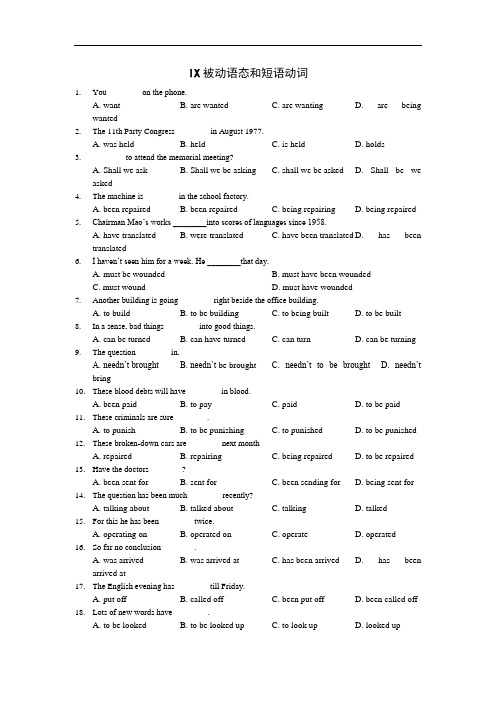
IX被动语态和短语动词1.You ________on the phone.A. wantB. are wantedC. are wantingD. are beingwanted2.The 11th Party Congress ________in August 1977.A. was heldB. heldC. is heldD. holds3.________to attend the memorial meeting?A. Shall we askB. Shall we be askingC. shall we be askedD. Shall be weasked4.The machine is ________in the school factory.A. been repairedB. been repairedC. being repairingD. being repaired5.Chairman Mao’s works ________into scores of languages since 1958.A. have translatedB. were translatedC. have been translatedD. has beentranslated6.I haven’t seen him for a week. He ________that day.A. must be woundedB. must have been woundedC. must woundD. must have wounded7.Another building is going ________right beside the office building.A. to buildB. to be buildingC. to being builtD. to be built8.In a sense, bad things ________into good things.A. can be turnedB. can have turnedC. can turnD. can be turning9.The question ________in.A. needn’t broughtB. needn’t be broughtC. needn’t to be broughtD. needn’tbring10.These blood debts will have ________in blood.A. been paidB. to payC. paidD. to be paid11.These criminals are sure________.A. to punishB. to be punishingC. to punishedD. to be punished12.These broken-down cars are ________next monthA. repairedB. repairingC. being repairedD. to be repaired13.Have the doctors________?A. been sent forB. sent forC. been sending forD. being sent for14.The question has been much ________recently?A. talking aboutB. talked aboutC. talkingD. talked15.For this he has been ________twice.A. operating onB. operated onC. operateD. operated16.So far no conclusion________.A. was arrivedB. was arrived atC. has been arrivedD. has beenarrived at17.The English evening has ________till Friday.A. put offB. called offC. been put offD. been called off18.Lots of new words have ________.A. to be lookedB. to be looked upC. to look upD. looked up19.Women ________in the old days.A. were looked down uponB. were looked downC. had been looked down uponD. had been looked down20.Which of the following is not correct?A. They were given a warm send off at the airport.B. A warm send off was given to them at the airport.C. A warm send off was given them at the airport.D. They were given to a warm send off at the airport.21.Many cities became ________in the following months.A. liberationB. liberatingC. liberateD. liberated22.The book ________. We all like it very much.A. was well writtenB. well written writeC. is well writtenD. well wrote23.He ________to going to bed early.A. has got usedB. has usedC. has been usingD. has using24. A quarrel ________between Xiao Hong and Xiao Fang last night.A was broken out B. broken out C. broke out. D. is broken out25.This kind of cloth ________very well.A. washesB. is washedC. washedD. is beingwashed26.It ________that the meat cooks well.A. seemsB. is seemedC. was seemedD. seemed27.She is a very nice person ________.A. to be worked withB. to be working withC. to work withD. working with28.The boy ________stealing a pocket-radio from the shop.A. caughtB. was caughtC. caught inD. was catching in29.Brooke is so lazy that he ________very soon.A. is said to be firedB. is said that he was firedC. says to be firedD. is said to fire30.He insisted on ________to work in the poor countryside.A. sendingB. being sendingC. to be sentD. being sent31.The house was ________last night and the color TV set was stolen.A. broken outB. broken intoC. broken downD. broken away32.Though he ________, he still ________his theory.A. has laughed; stuck toB. was laughed at; was stuck toC. was laughed; was stuck toD. was laughed at; stuck to33.Frank is the kind of person whom people like to ________.A. make friend withB. make friends ofC. make friends byD. make friendswith34.I ________play the violin than the piano.A. would ratherB. had rather toC. would betterD. prefer to35.Would you mind ________your radio a little, please?A. turn overB. turn offC. to turn onD. turning down36.When you come to Wuhan, I can ________the night.A. put you up toB. put you down forC. put you toD. put you for37.She ________Robert for a year.A. has been married withB. married withC. married toD. has beenmarried to38.She ________seeing a dead dog.A. was terrified atB. was terrified inC. was terrified forD. was terrifiedwith39.I was ________as a worker in another factory.A. taken forB. taken toC. taken outD. taken on40.When he first ________ story telling, he used to ask many children to come and listen.A. took downB. took overC. took upD. took trouble in41.He ________a bus slowing down before the shop.A. caught sight ofB. caught the sight ofC. caught sight forD. caught his sight42.Then they ________home.A. set outB. set out forC. set offD. set about to43.In order to ________the gun it is necessary to taken up the gun.A. get out ofB. get along withC. get down forD. get rid of44.The guide ________to us all the objects of interest.A. pointed outB. pointed atC. pointed offD. pointed down45.We ________with that factory ________200 machines.A. made an order; forB. placed an order; forC. made an order; onD. placed an order;on46.Our class is ________forty boys and twenty two girls.A. made up forB. made use forC. made best ofD. made up of47.She will ________my troubles as well as my joys.A. spend inB. spareC. share withD. share48.The living conditions here don’t ________me.A. agree toB. fit forC. agree withD. fit with49.Sometimes they ________referees (调解员).A. acted asB. acted outC. acted forD. acted on50.She gave many excuses, but what they ________was that she didn’t want to come.A. added upB. added toC. added up toD. add up with51.The Red Army ________after the defeat of the first great revolution.A. came into beingB. came into forceC. came into officeD. come into use52.Luckily, he ________these people years ago.A. broke intoB. broke outC. broke away fromD. broke downfrom53.Would you ________a cup of coffee?A. care withB. care forC. care aboutD. care of54.Mao Zedong ________fighting for the bright future of China.A. was devoted toB. devoted toC. was devoted forD. devotedhimself for55.Led by Fang Zhimin, we ________northern Jiangxi.A. made our ways toB. made our way toC. got our way toD. made room for56.Zhu De was a person who always ________.A. kept his wordB. kept upC. got in a wordD. kept in mind57.We must learn to ________a bad job.A. made best ofB. make the best ofC. make sureD. make fun of58.When the war broke out they ________at once.A. were called forB. were called offC. were called upD. were called out59.The plan ________more careful work at preventing forest fires.A. called inB. called onC. called upD. called for60.The workers would ________the struggle for freedom and happiness.A. call onB. carry offC. call toD. carry on 1—10. BACDC BDABD 11—20. DDABB DCBAD 21—30. DCACA ACBAD 31—40. BDDAD ADADC 41—50. ABDAB DDCAC 51—60. ACBAB ABCDD。
初中英语语法被动语态专练(附习题和答案)

初中英语语法被动语态专练(附习题和答案)1被动语态中谓语动词的基本构成:be + done2八种时态的被动语态:(变be的时态即可,done不动)1)一般现在时:am / is / are + done①People grow rice in the south of the country.Rice is grown in the south of the country.②The school doesn't allow us to enter the chemistry lab without a teacher.We are not allowed to enter the chemistry lab without a teacher.2)一般过去时:was / were + done①They agreed on the building of a new car factory last month.The building of a new car factory was agreed on last month.②The students didn't forget his lessons easily.His lessons were not easily forgotten3)一般将来时:will + be done①They will send cars abroad by sea.Cars will be sent abroad by sea.②They will give plenty of jobs to sch ool-leavers.Plenty of jobs will be given to school-leavers.4)一般过去将来时:would + be done①The manager said they would complete the project by the end of the year.The manager said the project would be completed by the end of the year.②Theworkers told me they would mend the car as soon as possible.The workers told me that the car would be mended as soon as possible.5)现在进行时:am / is / are + being + done①The radio is broadcasting English lessons.English lessons are being broadcasted on the radio.②We are painting the rooms.The rooms are being painted.6)过去进行时:was / were + being + done①The workers were mending the road.The road was being mended.②This time last year we were planting trees here.Trees were being planted here this time last year.7)现在完成时:have / has + been + done①Someone has told me the sports meeting might be put off.I have been told the sports meeting might be put off.②He has brought his book here.His book has been brought here.8)过去完成时:had + been + done①When I got to the theatre, I f ound they had already sold out the tickets.WhenI got to the theatre, I found the tickets had already been sold out.②The whole country was very sad at the news of his death; people hadconsidered him to be a great leader.The whole country was very sad at the news of his death; he had beenconsidered to be a great leader3含有情态动词的被动语态:情态动词+ be+ done①You must hand in your compositions after class.Your compositions must be handed in after class.②He can write a great many letters with the computer.A great many letters can be written with the computer by him.4被动语态的使用情况:1)当不知道或没有必要指出动作的执行者时,这时往往不用by短语。
初中中考英语语法被动语态的讲解-专项练习及参考答案
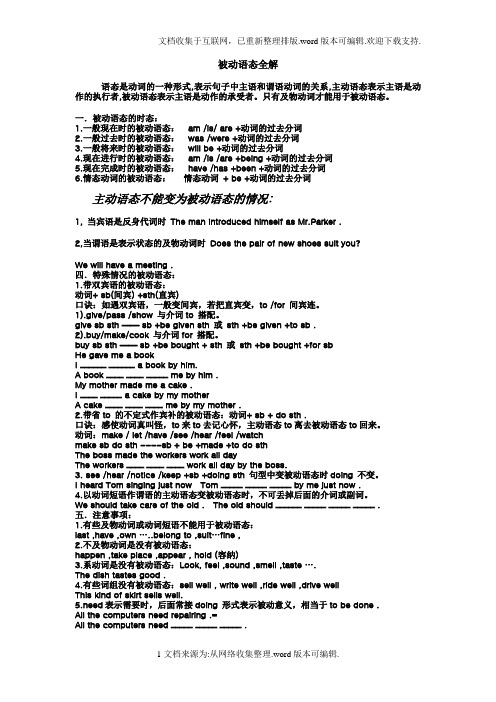
被动语态全解语态是动词的一种形式,表示句子中主语和谓语动词的关系,主动语态表示主语是动作的执行者,被动语态表示主语是动作的承受者。
只有及物动词才能用于被动语态。
一.被动语态的时态:1.一般现在时的被动语态:am /is/ are +动词的过去分词2.一般过去时的被动语态:was /were +动词的过去分词3.一般将来时的被动语态:will be +动词的过去分词4.现在进行时的被动语态:am /is /are +being +动词的过去分词5.现在完成时的被动语态:have /has +been +动词的过去分词6.情态动词的被动语态:情态动词+ be +动词的过去分词主动语态不能变为被动语态的情况:1, 当宾语是反身代词时The man introduced himself as Mr.Parker .2,当谓语是表示状态的及物动词时Does the pair of new shoes suit you?We will have a meeting .四.特殊情况的被动语态:1.带双宾语的被动语态:动词+ sb(间宾) +sth(直宾)口诀:如遇双宾语,一般变间宾,若把直宾变,to /for 间宾连。
1).give/pass /show 与介词to 搭配。
give sb sth —— sb +be given sth 或sth +be given +to sb .2).buy/make/cook 与介词for 搭配。
buy sb sth —— sb +be bought + sth 或sth +be bought +for sbHe gave me a bookI ______ ______ a book by him.A book ____ ____ _____ me by him .My mother made me a cake .I ____ _____ a cake by my motherA cake ____ ____ ____ me by my mother .2.带省to 的不定式作宾补的被动语态:动词+ sb + do sth .口诀:感使动词真叫怪,to来to去记心怀,主动语态to离去被动语态to回来。
暑期初高中衔接英语语法专项练习:XI动词不定试(含答案)
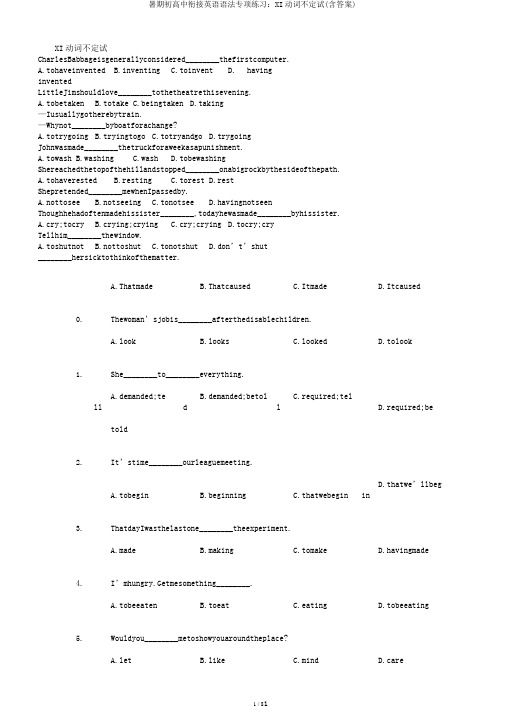
XI动词不定试CharlesBabbageisgenerallyconsidered________thefirstcomputer.A.tohaveinventedB.inventingC.toinventD. havinginventedLittleJimshouldlove________tothetheatrethisevening.A.tobetakenB.totakeC.beingtakenD.taking—Iusuallygotherebytrain.—Whynot________byboatforachange?A.totrygoingB.tryingtogoC.totryandgoD.trygoingJohnwasmade________thetruckforaweekasapunishment.A.towashB.washingC.washD.tobewashingShereachedthetopofthehillandstopped________onabigrockbythesideofthepath.A.tohaverestedB.restingC.torestD.restShepretended________mewhenIpassedby.A.nottoseeB.notseeingC.tonotseeD.havingnotseenThoughhehadoftenmadehissister________,todayhewasmade________byhissister.A.cry;tocryB.crying;cryingC.cry;cryingD.tocry;cryTellhim________thewindow.A.toshutnotB.nottoshutC.tonotshutD.don’t’shut________hersicktothinkofthematter.A.ThatmadeB.ThatcausedC.ItmadeD.Itcaused10.Thewoman’sjobis________afterthedisablechildren.A.lookB.looksC.lookedD.tolook11.She________to________everything.A.demanded;te llB.demanded;betoldC.required;tell D.required;betold12.It’stime________ourleaguemeeting.A.tobeginB.beginningC.thatwebeginD.thatwe’llbeg in13.ThatdayIwasthelastone________theexperiment.A.madeB.makingC.tomakeD.havingmade14.I’mhungry.Getmesomething________.A.tobeeatenB.toeatC.eatingD.tobeeating15.Wouldyou________metoshowyouaroundtheplace?A.letB.likeC.mindD.care16.Sheissaid________thenecklace.A.thatshelostB.thatshehaslostC.toloseD.tohavelost17.Whatdoyouthinkisthebestway________theproblem?A.tosettlingB.inwhichsettling C.tosettle D.settling18.Youare________retellthestory.A.oughtB.oughttoC.expectingD.expectedto19.Ididn’twanttheproblem________again.A.toraiseB.toberaisedC.beingraisedD.beraised20.Haveyouhadthenurse________yourson’stemperatu re?A.totakeB.takingC.takeD.take n2 1.Firstweshouldfindahotel________forthenight.A.toputupatitB.inordertoputupatC.atwheretoputupD.atwhichtoputup22.________wakemeupwhenyoucomein.A.You’dbetternottoB.You’dbetternotC.Youhadn’tbetterDto.Youhadn’tbetter23.Idon’tthinkyouneed________today.A.toleaveB.tobeleaving C.leavingD.beingleft24.Wehavebeenlookingforthegirlallthemorning,butsheisnowhere________.A.toseeB.tobeseen C.beingseen D.seen25.Heshould________forwhathehasdone.A.praiseB.bepraisedC.havepraised D.tobepraised26.Hefeltastone________hisback.A.hittingB.tohitC.hittedD.hit27.Ihurriedtoschool,only________outitwasSunday.A.findB.tofindC.foundD.wouldfind28.Herearesomeexercisesthatneed________afterclass.A.doneB.tobedone C.beingdone D.todo29.I’vebeenwaitingforhalfanhour________methephonecall.A.togiveB.foryougivingC.ofyoutogiD.foryoutogivve e30.Everything________smoothly.A.seemsgoingB.seemstobegoingC.isseemingto goD.isseemingtobegoing3 1.Itwasthoughtful________usthemapofthecity.A.ofyoutosendB.foryoutosendC.ofyousendingD.foryousending32.Youarefortunate________asamemberoftheclub.A.beingaccepte dB.toaccept C.TohaveacceptedD.tohavebeenaccepted3 3.________wasn’tpleasant________upsoearly.A.He;towakeB.He;tobewakenC.It;ofhimtowakeD.It;tobewoken3 4.Ifindtheseproblemsareeasy________.A.toworkoutB.tobeworkedoutC.inworkingout D.tobeworkedthemout3 5.Howrude________him________achildlikethat.A.of;totreatB.for;totreatC.of;istotreatD.for;istotreat36.Itwasstupid________him________attendthelecture.A.of;tonotB.of;notto C.for;tonotD.for;notto3 7.Itwasimpossible________losttimeto________.A.for;makeupB.of;makeupC.for;bemadeup D.of;bemadeup38.Theshoesaretoolarge________.A.tometowearB.formetowearC.tometobewornD.formetobeworn39.________wassorry________madesuchasillymistake.A.It;tohaveB.It;having C.I;tohaveD.I;having40.I’llbedelighted________.A.whenI’llseeyouagainB.toseeyouagai nC.thatIseeyouagain D.tohaveseenyouagain4 1.Hewas________tired________anyfurther.A.too;walkingB.too;towalkC.so;walkingD.so;towalk42.Willyoube________kind________maketeaforme?A.so;toB.fairly;toC.so;astoD.fairly;ast o4 3.Thechairlooksratherhard,butinfactitisverycomfortableto________.A.sitB.sitonC.besatD.besaton44.I________howtoanswerthequestion.A.puzzleB.ampuzzlingC.havepuzzledD.ampuzzled45.Haveyoudecided________theparty?A.whetheryouholdB.whytoholdC.whethertohold D.iftohold46.Hedoesn’tknow________tostayornot.A.ifB.eitherC.neitherD.whetherheought4stsummerItookacourseon________.A.howtomakedresses B.howdressesbemadeC.howtobemadedressesD.howdressestobemade48.Hehesitated________themedicine.A.takingB.abouttotakeC.whetherhetakeD.whethertotake49.Howdothebirdsknowexactly________direction________?A.which,flyingB.which;toflytoC.inwhich;tofly D.X;flyingto—Idon’tknow________withtheproblem.—Whynot________yourteacherforadvise?A.whattodo;toaskB.howtodo;toaskC.whattodo;askD.howtodo;ask51. Ithinkheshouldgetajob,butyoucan ’tforceifheim’snotr eady________.A.toget;toB.toget;XC.to;X D;to;todo —Wouldyouliketogototheball?—Yes,________.A.I ’dB.I ’d likeC.I ’dliketoD.I ’dliketogo—Aren’tyouinchargeofthis?—No,andI________.A.don’twantB.don’twanttoC.don’twanttobe Damnot5 4.________thetruth,Idon’twanttogo .A.TotellB.TellC.TellingD.Inordert otell55.I’dratherreadsomethingathomethan________totheparkinsuchweather.A.goB.togoC.goingD.went5 6.Wecoulddonothingbut________Fatherforhelp.A.askB.askingC.toaskD.asked57.Hewantednothingbut________inthecorner.A.seatB.beseatedC.beseatD.tobeseat ed58.It________abouttwoyears________suchabigdam.A.takes;inbuilding B.takes;tobuildC.needs;inbuildingD.needs;tobuild5 9.Howmuchdid________cost________thehouse?A.it;inrebuilding B.he;inrebuilding C.it;torebuildD.he;torebu ild60.________requirespatience________agoodnurse.A.She;tobe B.she;ifsheis C.It;tobeD.It;ifshei s1—10.AADACAABCD11—20.BACBB DCDBC21—30.DBABBDBBDB31—40.ADDAABCBCB41—50.BCBDCDADCC51—CAAADBCC。
高中英语语法复习被动语态讲义+练习含答案
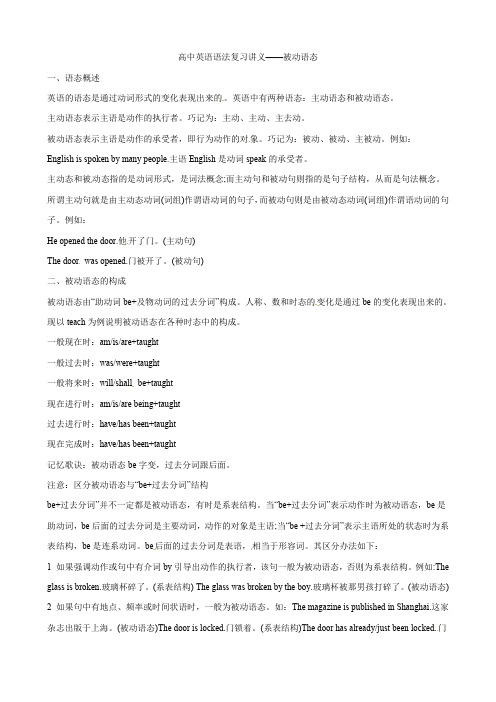
高中英语语法复习讲义——被动语态一、语态概述英语的语态是通过动词形式的变化表现出来的。
英语中有两种语态:主动语态和被动语态。
主动语态表示主语是动作的执行者。
巧记为:主动、主动、主去动。
被动语态表示主语是动作的承受者,即行为动作的对象。
巧记为:被动、被动、主被动。
例如:English is spoken by many people.主语English是动词speak的承受者。
主动态和被动态指的是动词形式,是词法概念;而主动句和被动句则指的是句子结构,从而是句法概念。
所谓主动句就是由主动态动词(词组)作谓语动词的句子,而被动句则是由被动态动词(词组)作谓语动词的句子。
例如:He opened the door.他开了门。
(主动句)The door was opened.门被开了。
(被动句)二、被动语态的构成被动语态由“助动词be+及物动词的过去分词”构成。
人称、数和时态的变化是通过be的变化表现出来的。
现以teach为例说明被动语态在各种时态中的构成。
一般现在时:am/is/are+taught一般过去时:was/were+taught一般将来时:will/shall be+taught现在进行时:am/is/are being+taught过去进行时:have/has been+taught现在完成时:have/has been+taught记忆歌诀:被动语态be字变,过去分词跟后面。
注意:区分被动语态与“be+过去分词”结构be+过去分词”并不一定都是被动语态,有时是系表结构。
当“be+过去分词”表示动作时为被动语态,be是助动词,be后面的过去分词是主要动词,动作的对象是主语;当“be +过去分词”表示主语所处的状态时为系表结构,be是连系动词。
be后面的过去分词是表语,相当于形容词。
其区分办法如下:1 如果强调动作或句中有介词by引导出动作的执行者,该句一般为被动语态,否则为系表结构。
例如:The glass is broken.玻璃杯碎了。
(英语)高中必备英语被动语态技巧全解及练习题(含答案)及解析

(英语)高中必备英语被动语态技巧全解及练习题(含答案)及解析一、单项选择被动语态1.--- Why don't we choose that road to save time?--- The bridge to it .A.has repaired B.is repairedC.is being repaired D.will be repaired【答案】C【解析】考查时态和语态。
句意为:——我们为什么不选那条路以节省时间呢?——通往那条路的桥正在维修。
桥正在被维修,故用现在进行时的被动语态。
答案:C2.Our teacher keeps telling us that the future to the well-educated.A.belonging B.belongs C.is belonging D.is belonged【答案】B【解析】考查短语:belong to 属于,没有进行时态没有被动语态。
故答案选B。
3.No decision __A_ about any future appointment until all the candidates have been interviewed.A.will be made B.is madeC.is being made D.has been made【答案】A【解析】试题分析:考查时态,主语是decision和动词make是动宾关系,所以用被动式,因为后面的句子about any future appointment可以知道动作未发生,所以用将来时,句子意思“关于未来会议没有做出任何决定直到所有的报考者已经被采访”,所以选A考点:考查时态点评:做时态题时,首先看时间状语,由时间状语来确定句子的时态;如果没有时间状语,可以根据隐含的意思来确定句子时态。
4.It's great that all the visitors who on the island were saved.A.trapped B.have been trappedC.had trapped D.had been trapped【答案】D【解析】【详解】考查时态和被动语态。
初升高英语暑假衔接第1部分-专题09.动词语态(教师版)

动词语态(初高考点差异及衔接)初中要求8种常见时态的被动语态表达形式:①一般现在时:am/is/are+过去分词;②一般过去时:was/were+过去分词;③现在进行时:am/is/are being+过去分词;④过去进行时:was/were being+过去分词;⑤一般将来时:will be+过去分词;⑥过去将来时:would be+过去分词;⑦现在完成时:has/have been+过去分词;⑧过去完成时:had been+过去分词。
高中要求我们将学习到更复杂的语法结构,因此主动语态和被动语态也会相对复杂一些。
被动语态在高中阶段,因为往往出现在较复杂的句子结构和词汇中,因而需要在学习的时候认真记忆词汇并分析句子结构。
【初中被动语态考点聚焦】考点一一般现在时的被动语态1.Every year in early October,Albuquerque International Balloon Festival is h inAlbuquerque,the biggest city in New Mexico.答案held句意:每年10月初,阿尔伯克基国际热气球节在新墨西哥州最大的城市阿尔伯克基举行。
本题考查动词的语态。
根据句意可知,此处意思是“举行”,且表示被动,故填held 。
2.There is also Hershey,which is well (know)as the chocolate company.答案known短语be well known as...意为“作为……而著名”。
3.It’s also (call)the Double Ninth Festival.答案called它又被称作重阳节。
根据语义可知本句应为被动语态,应用过去分词called 。
4.—How clean your car is!—Thank you.It (wash)very often.答案is washed句意:——你的汽车多干净啊!——谢谢你。
- 1、下载文档前请自行甄别文档内容的完整性,平台不提供额外的编辑、内容补充、找答案等附加服务。
- 2、"仅部分预览"的文档,不可在线预览部分如存在完整性等问题,可反馈申请退款(可完整预览的文档不适用该条件!)。
- 3、如文档侵犯您的权益,请联系客服反馈,我们会尽快为您处理(人工客服工作时间:9:00-18:30)。
IX被动语态和短语动词1.You ________on the phone.A. wantB. are wantedC. are wantingD. are beingwanted2.The 11th Party Congress ________in August 1977.A. was heldB. heldC. is heldD. holds3.________to attend the memorial meeting?A. Shall we askB. Shall we be askingC. shall we be askedD. Shall be weasked4.The machine is ________in the school factory.A. been repairedB. been repairedC. being repairingD. being repaired5.Chairman Mao’s works ________into scores of languages since 1958.A. have translatedB. were translatedC. have been translatedD. has beentranslated6.I haven’t seen him for a week. He ________that day.A. must be woundedB. must have been woundedC. must woundD. must have wounded7.Another building is going ________right beside the office building.A. to buildB. to be buildingC. to being builtD. to be built8.In a sense, bad things ________into good things.A. can be turnedB. can have turnedC. can turnD. can be turning9.The question ________in.A. needn’t broughtB. needn’t be broughtC. needn’t to be broughtD. needn’tbring10.These blood debts will have ________in blood.A. been paidB. to payC. paidD. to be paid11.These criminals are sure________.A. to punishB. to be punishingC. to punishedD. to be punished12.These broken-down cars are ________next monthA. repairedB. repairingC. being repairedD. to be repaired13.Have the doctors________?A. been sent forB. sent forC. been sending forD. being sent for14.The question has been much ________recently?A. talking aboutB. talked aboutC. talkingD. talked15.For this he has been ________twice.A. operating onB. operated onC. operateD. operated16.So far no conclusion________.A. was arrivedB. was arrived atC. has been arrivedD. has beenarrived at17.The English evening has ________till Friday.A. put offB. called offC. been put offD. been called off18.Lots of new words have ________.A. to be lookedB. to be looked upC. to look upD. looked up19.Women ________in the old days.A. were looked down uponB. were looked downC. had been looked down uponD. had been looked down20.Which of the following is not correct?A. They were given a warm send off at the airport.B. A warm send off was given to them at the airport.C. A warm send off was given them at the airport.D. They were given to a warm send off at the airport.21.Many cities became ________in the following months.A. liberationB. liberatingC. liberateD. liberated22.The book ________. We all like it very much.A. was well writtenB. well written writeC. is well writtenD. well wrote23.He ________to going to bed early.A. has got usedB. has usedC. has been usingD. has using24. A quarrel ________between Xiao Hong and Xiao Fang last night.A was broken out B. broken out C. broke out. D. is broken out25.This kind of cloth ________very well.A. washesB. is washedC. washedD. is beingwashed26.It ________that the meat cooks well.A. seemsB. is seemedC. was seemedD. seemed27.She is a very nice person ________.A. to be worked withB. to be working withC. to work withD. working with28.The boy ________stealing a pocket-radio from the shop.A. caughtB. was caughtC. caught inD. was catching in29.Brooke is so lazy that he ________very soon.A. is said to be firedB. is said that he was firedC. says to be firedD. is said to fire30.He insisted on ________to work in the poor countryside.A. sendingB. being sendingC. to be sentD. being sent31.The house was ________last night and the color TV set was stolen.A. broken outB. broken intoC. broken downD. broken away32.Though he ________, he still ________his theory.A. has laughed; stuck toB. was laughed at; was stuck toC. was laughed; was stuck toD. was laughed at; stuck to33.Frank is the kind of person whom people like to ________.A. make friend withB. make friends ofC. make friends byD. make friendswith34.I ________play the violin than the piano.A. would ratherB. had rather toC. would betterD. prefer to35.Would you mind ________your radio a little, please?A. turn overB. turn offC. to turn onD. turning down36.When you come to Wuhan, I can ________the night.A. put you up toB. put you down forC. put you toD. put you for37.She ________Robert for a year.A. has been married withB. married withC. married toD. has beenmarried to38.She ________seeing a dead dog.A. was terrified atB. was terrified inC. was terrified forD. was terrifiedwith39.I was ________as a worker in another factory.A. taken forB. taken toC. taken outD. taken on40.When he first ________ story telling, he used to ask many children to come and listen.A. took downB. took overC. took upD. took trouble in41.He ________a bus slowing down before the shop.A. caught sight ofB. caught the sight ofC. caught sight forD. caught his sight42.Then they ________home.A. set outB. set out forC. set offD. set about to43.In order to ________the gun it is necessary to taken up the gun.A. get out ofB. get along withC. get down forD. get rid of44.The guide ________to us all the objects of interest.A. pointed outB. pointed atC. pointed offD. pointed down45.We ________with that factory ________200 machines.A. made an order; forB. placed an order; forC. made an order; onD. placed an order;on46.Our class is ________forty boys and twenty two girls.A. made up forB. made use forC. made best ofD. made up of47.She will ________my troubles as well as my joys.A. spend inB. spareC. share withD. share48.The living conditions here don’t ________me.A. agree toB. fit forC. agree withD. fit with49.Sometimes they ________referees (调解员).A. acted asB. acted outC. acted forD. acted on50.She gave many excuses, but what they ________was that she didn’t want to come.A. added upB. added toC. added up toD. add up with51.The Red Army ________after the defeat of the first great revolution.A. came into beingB. came into forceC. came into officeD. come into use52.Luckily, he ________these people years ago.A. broke intoB. broke outC. broke away fromD. broke downfrom53.Would you ________a cup of coffee?A. care withB. care forC. care aboutD. care of54.Mao Zedong ________fighting for the bright future of China.A. was devoted toB. devoted toC. was devoted forD. devotedhimself for55.Led by Fang Zhimin, we ________northern Jiangxi.A. made our ways toB. made our way toC. got our way toD. made room for56.Zhu De was a person who always ________.A. kept his wordB. kept upC. got in a wordD. kept in mind57.We must learn to ________a bad job.A. made best ofB. make the best ofC. make sureD. make fun of58.When the war broke out they ________at once.A. were called forB. were called offC. were called upD. were called out59.The plan ________more careful work at preventing forest fires.A. called inB. called onC. called upD. called for60.The workers would ________the struggle for freedom and happiness.A. call onB. carry offC. call toD. carry on 1—10. BACDC BDABD 11—20. DDABB DCBAD 21—30. DCACA ACBAD 31—40. BDDAD ADADC 41—50. ABDAB DDCAC 51—60. ACBAB ABCDD。
